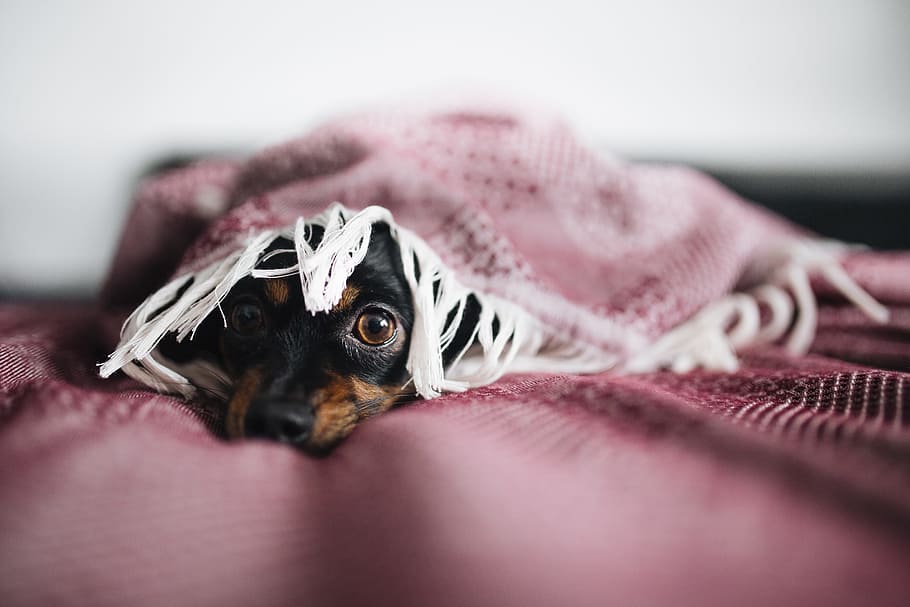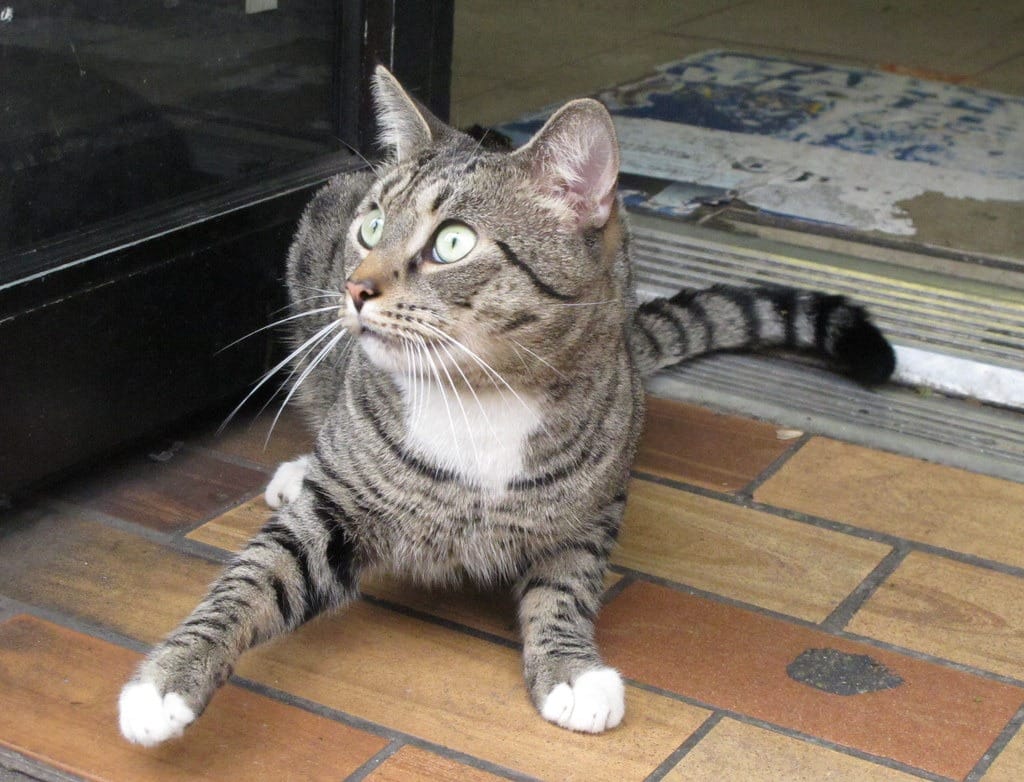While many humans enjoy the bling and bang of fireworks at this time of year, most pets truly believe that something is trying to kill them.
It hurts their ears, unnerves them and the fear coursing through their nervous systems can cause some pretty unpredictable behavior.
To gear up for the 4th of July, animal shelters do their best to make space for pets that run away from home because firework displays have scared them beyond rational thought.
Some of these pets will be reunited with their owners and they are the lucky ones.
Many run farther than their local shelter’s area, some for many miles.
Here, where we have robust wildlife populations, many pets become prey if left unattended for long.
Those who are found without ID leave shelter workers without a clue who to notify.
These tips will help keep your pet SECURE and make enduring the scary noises easier.


BEFORE the noise begins:
1
Be sure your pet has a well-fitting collar with updated identification. Look at those tags–has anything changed since they were made? Many pet owners take collars off while the animals are indoors. Leave them on from the time fireworks go on sale until you stop hearing them go off, just in case your pet unexpected lunges to escape and catches you, or a visitor, off guard. Pets end up in shelters at this time of year after owners did everything right …and a guest unwittingly let the critter dash out.
2
Microchip! No identification method is foolproof, so the more you use, the more likely you and your pet will find one another again. If you wonder if your pet’s microchip has migrated to where it won’t be easily scanned, stop in and we’ll be glad to scan your pet now, before there is a problem, and let you know if he or she needs a vet visit.
3
Consider a vet visit before the holiday if you know your pet to be anxious around loud noises. Your vet may prescribe medications to help get him or her through the sparks, pops and bangs, or may recommend pheromone diffusers or behavioral therapy from a professional. If your dog is prone to being anxious, consider a ThunderShirt, which are snug-fitting jackets very successful at relieving anxiety in cats and dogs. We use them here at the shelter if you’d like to see one in person.
4
Take your pet for a walk or play date before the fireworks start. This allows your dog to exercise, release energy and, of course, go “potty”. If Spot has less energy from having gotten good, old-fashioned, exercise, there won’t be as much left for anxiety.
5
Set up a familiar, sheltered, quiet play area. In addition to the stress the noise and smell of fireworks put on your pet, some dogs and cats become destructive when they are frightened. This is especially true when left alone, in unfamiliar or wide-open spaces. Restrict your pet to the most protected area you have, perhaps a basement, bathroom or bedroom. Remove items that might be harmful or easily chewed; remember, your pet won’t necessarily act normally when frightened (see our photo gallery, below). Get Spot acquainted with the space while life is still ‘normal’, and be sure food, and especially water, are available.
6
Do NOT crate your pet. While they’ll undoubtedly enjoy having access to their normal den, the crate, locking them inside during a stressful time can make your pet feel trapped if they are truly scared of the noise. They can hurt themselves trying to escape. If Spot is used to a crate, be sure the door is left open for easy entrance and exit.
7
Keep Spot indoors as much as possible. When Spot needs to go out do your best to take care of business during daylight hours and that the lead is secure. Oh, how many stories we’ve heard of pets who have uncharacteristically bolted and gotten away from their people when an unexpected BANG is involved! Your job is to make it hard for them to bolt and become lost–or worse.
8
If your pet has a pal that is NOT scared by noises, keeping the two together during the evenings may help your dog to realize that there’s no need to be afraid. Dogs take their cues from other dogs far more successfully than from humans. We’ve seen “crazy neurotic” dogs become “sleepy calm” about the noise when kept with one or two dogs they trust who act unaffected.
Special note for small animals:
If your pets live outdoors and simply must remain outside, partly cover cages, pens and aviaries with blankets so that one area is well sound-proofed. Make sure that your pet is still able to look out.
WHEN the noise begins:
1
Close windows and curtains at dusk and put on music or tv to mask and muffle the sound of fireworks.
2
If your pet shows any signs of fear try to ignore their behavior. Leave them alone unless they are likely to harm themselves. Never punish or fuss over your pet when it’s scared as this will only make things worse in the long run as you’re reinforcing that there is something to fear.
3
Each evening before the fireworks begin, move Spot to the play area and provide toys and other things that they enjoy. Make sure that there are things for you to do too so that your dog isn’t left alone. Ignore the noise yourself. Play with a toy to see if your pet wants to join in, but don’t force them to play. Don’t try to coax your fur-friend out of a hiding place; you’ve created a safe environment so you can ignore the behavior.
4
Do NOT leave your pet outdoors. The noise is louder. Fido may well try to escape the yard, harming himself and/or your property in the process. And, once he’s out, it just gets worse for both of you. And, whatever you do, don’t chain your pet in the yard. In an extraordinary effort to escape, she may get entangled and hurt, or even accidentally strangled.
5
Don’t take your dog to a fireworks display. Resist the urge to bring your dog to the celebration. If you leash your pet to be with you, they can still be traumatized and even escape your control and be lost.
6
Do NOT leave your pet in the car. Perhaps the scariest of “dog prisons” when your pet is afraid, heat alone can seriously harm or even kill your pet. Adding heat exposure to the tumult of a fireworks show may leave Spot terrorized. Don’t risk returning to find a dead pet or a destroyed vehicle.
If you wouldn’t expose your infant, don’t expose your pet.
Here at SPCHS, we wish a safe, sane and enjoyable holiday for the entire family.
If you do need help finding a pet:
1
Be sure to give us a call at 360-642-1180
2
Post to our facebook page, (and that of the area’s Missing Pets page). Include a photo, description of your pet, where and when the pet was last seen, and how to contact you. If you need help creating a flyer, you can grab a template here.
3
Bring us some flyers, (330 NE Second Street in Long Beach, WA), and
4
Email spchs330@gmail.com.
We’re here to help!
AFTER the noise is gone for another year:
1
If Spot had a rough go of it, consider contacting your vet or an animal behaviorist about therapy to desensitize the response to noise.
2
Try sound desensitization therapy on your own using a program like http://www.soundtherapy4pets.co.uk/scary.html
